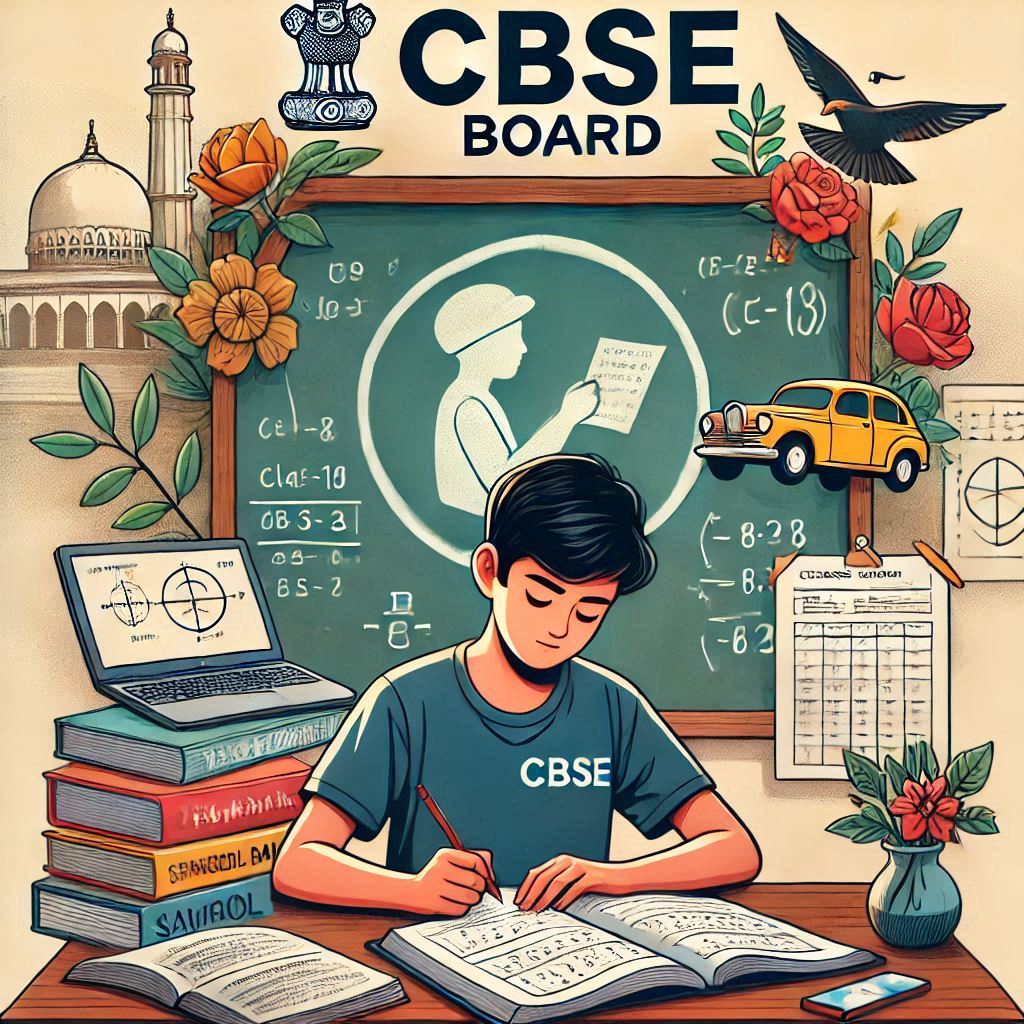CBSE Class 10 Mathematics Exam: Tips, Strategies, and Resources
The CBSE Class 10 board exams 2026 are a crucial moment in a your academic life. Mathematics, in particular, is a subject that requires a complex understanding of concepts and theorem, consistent practice, and strategic preparation. To achieving above 90% in the CBSE Class 10 Mathematics exam is not just a your dream but a highly achievable goal with the right approach. This comprehensive guide will able you to know everything you need to know for effective study plans and best resources.

Table of Contents
Understanding the CBSE Class 10 Mathematics Syllabus
The first step towards effective preparation , You have to a clear understanding of the CBSE Class 10 Mathematics syllabus. The syllabus is cover a wide range of topics that are fundamental to higher-level mathematics. Here’s a detailed breakdown of the key units and their weightage for you:
- Number Systems
- Real Numbers
- Euclid’s Division Lemma
- Fundamental Theorem of Arithmetic
- Revisiting Irrational Numbers
- Decimal Expansions of Rational Numbers
- Algebra
- Polynomials
- Pair of Linear Equations in Two Variables
- Quadratic Equations
- Arithmetic Progressions
- Coordinate Geometry
- Concepts of Coordinate Geometry
- Distance Formula
- Section Formula
- Area of a Triangle
- Geometry
- Triangles
- Circles
- Constructions
- Trigonometry
- Introduction to Trigonometry
- Trigonometric Identities
- Heights and Distances
- Mensuration
- Areas Related to Circles
- Surface Areas and Volumes
- Statistics and Probability
- Mean, Median, and Mode of Grouped Data
- Cumulative Frequency Graphs
- Probability: A Theoretical Approach
Each unit carries a specific weightage in your board exam, and understanding this distribution helps in prioritizing topics during preparation maths. Typically, Algebra and Geometry have a higher weightage, making them crucial areas to focus on it.
Detailed Analysis of the Syllabus:
Number Systems:
- Real Numbers: This section deals with the real number system, including rational and irrational numbers. You’ll revisit concepts like the Fundamental Theorem of Arithmetic, which states that every composite number can be expressed as a product of primes, and Euclid’s Division Lemma, which is a way of expressing the division algorithm.
- Decimal Expansions: Understanding how rational numbers can be expressed as terminating or non-terminating repeating decimals, and how irrational numbers cannot be expressed in such a form, is key.
Algebra:
- Polynomials: This involves polynomials in one variable, their degrees, coefficients, and zeros. You’ll explore the relationship between zeros and coefficients, as well as how to add, subtract, and multiply polynomials.
- Pair of Linear Equations in Two Variables: This topic covers methods for solving pairs of linear equations, including graphical, substitution, elimination, and cross-multiplication methods.
- Quadratic Equations: You’ll learn to solve quadratic equations using factorization, completing the square, and the quadratic formula. Understanding the relationship between the discriminant and the nature of roots is essential.
- Arithmetic Progressions: This involves understanding sequences where the difference between consecutive terms is constant, finding the nth term, and calculating the sum of the first n terms.
Coordinate Geometry:
- Basics of Coordinate Geometry: Understanding the Cartesian plane, plotting points, and finding the distance between two points using the distance formula.
- Section Formula: This involves finding the coordinates of a point that divides a line segment joining two points in a given ratio.
- Area of a Triangle: Using coordinates to find the area of a triangle formed by three points.
Geometry:
- Triangles: This section includes the properties and criteria for the similarity of triangles, such as AA, SSS, and SAS criteria, and theorems related to the ratio of the areas of similar triangles.
- Circles: Understanding the properties of tangents to a circle, the number of tangents from a point outside a circle, and theorems related to these properties.
- Constructions: This involves constructing the bisectors of a line segment and angle, construction of similar triangles, and tangents to a circle.
Trigonometry:
- Basics of Trigonometry: Understanding the trigonometric ratios of an acute angle in a right-angled triangle.
- Trigonometric Identities: Proving and using identities like sin²A + cos²A = 1, and others derived from it.
- Heights and Distances: Applying trigonometric ratios to real-life situations involving heights and distances.
Mensuration:
- Areas Related to Circles: Finding the areas and perimeters of circles, sectors, and segments.
- Surface Areas and Volumes: Calculating the surface area and volume of 3D shapes like cuboids, cylinders, cones, spheres, and hemispheres.
Statistics and Probability:
- Statistics: This involves organizing and interpreting data using measures of central tendency (mean, median, mode) and graphical representations like histograms and frequency polygons.
- Probability: Understanding the theoretical probability of events, which is the foundation for more complex probability topics in higher classes.
Effective Study Plan in last maths.
As you know your Mathematics exam date which is issued by CBSE Board for class 10th 2026.
| Monday March, 2026 | Subject |
| 10:30AM – 01:30PM | (041 and 241) Mathematics(Standard and Basic) |
Our maths expert provide best strategies plans for your class 10th maths preparations before 1 months of board examinations. Let’s explore one by one and try to implement in your daily study routine.
Week 1: Revisit Basics
Day 1-2: Algebra
- Focus on understanding the fundamental concepts of polynomials and quadratic equations.
- Practice problems on factorization, roots of quadratic equations, and solving quadratic equations by different methods.
- Utilize resources like the NCERT textbook and reference books for diverse problem sets.
Day 3-4: Geometry
- Revise key concepts related to triangles and circles.
- Work on proving theorems and solving related problems.
- Pay special attention to properties of triangles, similarity criteria, and circle theorems.
Day 5-6: Number Systems and Real Numbers
- Review Euclid’s Division Lemma and the Fundamental Theorem of Arithmetic.
- Practice problems involving irrational numbers and decimal expansions of rational numbers.
- Ensure a solid grasp of these foundational concepts as they are essential for higher-level mathematics.
Day 7: Review and Practice Problems
- Spend the day reviewing the topics covered in the week.
- Solve a variety of practice problems to reinforce your understanding.
- Identify any weak areas and make note of them for further revision.
Week 2: Intensive Practice
Day 8-10: Trigonometry
- Begin with the basics of trigonometric ratios and their applications.
- Practice deriving and applying trigonometric identities.
- Solve problems involving heights and distances, ensuring you understand the practical applications of trigonometry.
Day 11-13: Statistics and Probability
- Review the concepts of mean, median, and mode of grouped data.
- Work on drawing and interpreting cumulative frequency graphs.
- Practice problems on theoretical probability and understand the fundamental principles.
Day 14: Coordinate Geometry
- Revise the distance formula, section formula, and the area of a triangle.
- Practice problems that involve calculating distances between points, dividing line segments, and finding areas.
Week 3: Revision and Mock Tests
Day 15-17: Solve Previous Year Papers
- Solve previous years’ CBSE Mathematics question papers.
- Practice under timed conditions to simulate the actual exam environment.
- Review your answers and note down any recurring mistakes or difficult areas.
Day 18-20: Full-length Mock Tests
- Take full-length mock tests to assess your overall preparation.
- Focus on time management and accuracy.
- After each test, analyze your performance thoroughly and work on areas where you lost marks.
Day 21: Analyze Mock Test Performance
- Review your mock test results in detail.
- Identify patterns in mistakes and work on those specific topics.
- Create a list of common errors and concepts that need more revision.
Week 4: Final Brush-Up
Day 22-24: Revise Key Formulas and Theorems
- Dedicate these days to revising important formulas, theorems, and properties.
- Create flashcards or summary sheets for quick reference.
- Ensure you have all key concepts at your fingertips.
Day 25-27: Speed and Accuracy Drills
- Focus on improving your speed and accuracy.
- Solve a variety of problems within a set time limit to enhance your problem-solving skills.
- Practice mental math and quick calculation techniques.
Day 28-30: Relaxation and Light Review
- Avoid starting new topics; focus on light revision of already covered material.
- Engage in relaxation techniques to manage stress and maintain a positive mindset.
- Ensure you get adequate sleep, nutrition, and exercise during these final days.
Top Resources for Preparation:
Having the right resources is crucial for effective preparation. Here are some recommended resources that can help you achieve your goal:
- NCERT Textbook: The NCERT textbook is the primary and most reliable resource for CBSE Mathematics. It covers the entire syllabus comprehensively and provides a variety of problems for practice.
- Sample Papers: Solving sample papers is an excellent way to aware yourself with the exam pattern and question types. You can find sample papers on the CBSE Academic website and other educational portals.
- Previous Years Questions: 1 months before your board examinations, you must solve the PYQs to aware with important concepts, formulas, theorem and frequently asked questions in board maths papers.
- Reference Books: Books by RD Sharma and RS Aggarwal are highly recommended for additional practice and concept clarity. They offer a wide range of problems, from basic to advanced levels, along with detailed solutions.
- Online Resources: Online video tutorials, practice problems, and interactive quizzes. These resources can help reinforce your understanding and provide additional practice.
- Coaching Classes: If you prefer guided learning, joining a coaching class or taking online tutoring sessions can provide personalized attention and structured preparation.

Tips for Success
Here are some tips to enhance your preparation:
- Regular Practice: Consistency is best key to crack Mathematics examinations. Set aside dedicated time each day for practice and stick to your study schedule.
- Clear Doubts: Don’t hesitate to seek help from your school teachers, classmates, or online tutor to clear all doubts. Understand concepts is crucial for solving problems accurately.
- Healthy Routine: Maintain a daily study routine with proper breaks, proper nutrition, and sufficient sleep. A healthy mind and body contribute to better focus and performance in your best preparation.
- Mock Tests class test: Regularly take mock tests or class test to assess your preparation and improve your exam-taking skills. Analyze your performance and work on weak areas.
- Revision: Regularly revise key concepts, formulas, and all theorems(most theorem form triangle and circle). Paste flashcards, summary sheets, and mind maps on walls of your study rooms for quick revision.
- Stress Management: Practice relaxation techniques such as deep breathing, meditation, or yoga to manage stress and stay calm before board exams and during the exams.

Common Mistakes to Avoid
While preparing for the Mathematics exam, avoid these common mistakes:
- Skipping Basics: Ensure you have a strongs in basic concepts before moving on to advanced topics. Weak basics can lead to difficulties in solving complex problems.
- Ignore new chapter or theorem: 10 days before the examinations, don’t try to learn new concepts and theorems. Make patience and believe on your school and tutor guide. keep regular revision on them.
- Ignoring NCERT: Don’t overlook the NCERT textbook. It is the most important resource for the CBSE syllabus and provides a thorough understanding of keys concepts.
- Delay: Avoid procrastination and stick to your study schedule. Regular practice is essential for boost Mathematics.
- Lack of Time Management: Practice managing your time effectively during the exam. Allocate time for each question and avoid spending too much time on any one question can cause other easy questions are left due to insufficient time during examination.
- Overloading with Resources: While additional resources are helpful, avoid overwhelming yourself with too many books and study materials. Focus on a few reliable sources and study them thoroughly NCERT, NCERT Exemplar, Sample Paper and PYQs .

Advanced Study Techniques
To push your preparation to the next level, consider incorporating these advanced study techniques:
- Active Learning: Instead of passively reading through the material, engage in active learning by solving problems, teaching concepts to others, and applying concepts to real-life situations.
- Interleaved Practice: Mix different types of problems during your practice sessions. This technique, known as interleaved practice, can help improve problem-solving skills and retention.
- Spaced Repetition: Use spaced repetition techniques to review material at increasing intervals. This method helps reinforce long-term memory and recall.
- Mind Mapping: Create mind maps to visually organize and connect different concepts. This can help you see the bigger picture and understand relationships between topics.
- Peer Study Groups: Join or form study groups with classmates. Discussing problems and solutions with peers can provide new insights and enhance understanding.

Exam Day Strategies
On the day of the exam, it’s essential to have a clear strategy to maximize your performance. Here are some tips for exam day:
- Take proper rest before going to examination hall and build self confidence. Make distance from those student who are confused or negative students.
- Avoid to learn unknown theorem or formulas and do not try solve hots questions expects PYQs.
- Read Instructions Carefully: Take a few minutes to read the instructions and understand the exam format. Ensure you follow the guidelines for answering questions.
- Time Management: Allocate time for each section and question based on the marks and difficulty level. Avoid spending too much time on any single question.
- Attempt Easy Questions First: Start with the questions you find easiest to build confidence and secure good marks. This approach can also help manage time effectively.
- Show Work Clearly: Write your solutions neatly and show all steps clearly. Partial marks are often awarded for correct steps, even if the final answer is incorrect. Do not cut your rough works. left it clean.
- Review Your Answers: If time permits, review your answers to check for any mistakes or omissions. Ensure you have attempted all questions and filled out the answer sheet correctly in omr sheet.

Importance of Mental and Physical Well-being

Preparing for board exams can be stressful, but maintaining mental and physical well-being is crucial for optimal performance. Here are some tips to take care of yourself during the preparation period:
- Balanced Diet: Eat a balanced diet rich in fruits, vegetables, grains, and proteins. Avoid excessive junk food and sugary snacks, which can affect energy levels and concentration.
- Regular Exercise: Engage in regular physical activity, such as walking, jogging, yoga, or any sport you enjoy. Exercise helps reduce stress and improves overall well-being.
- Loudness Sleep: Ensure you get sufficient sleep each night. Lack of sleep can affect memory, concentration, and cognitive function. Aim for at least 7-8 hours of sleep.
- Mindfulness and Relaxation: Practice mindfulness techniques such as deep breathing, meditation, or progressive muscle relaxation. These practices can help manage stress and improve focus.
- Healthy Study Environment: Create a conducive study environment with minimal distractions. you can join library if possible or separate room. A well-organized and quiet study space can enhance productivity and concentration.
Conclusion
To score above 90% in the CBSE Class 10 Mathematics exam, you need to have the right preparation and mindset. First, you need to understand the complete syllabus. This means knowing the topics that will be covered on the exam and understanding the depth of each topic before board exams. Second, you need to follow a structured and effective study plan. This means setting specific times plans each day to study for the exams. Third, you need to utilize the best resources available to you(we explain above). Finally, you need to practice consistently. This means doing practice problems on a regular basis. Remember to stay motivated before and during the exams. Also, you need to manage your stress. This means taking breaks when you need them and avoiding distractions(mobile and Social Media). Finally, you need to maintain a positive attitude and self confidence. Your hard work and dedication will pay off on exam day and in your result.



